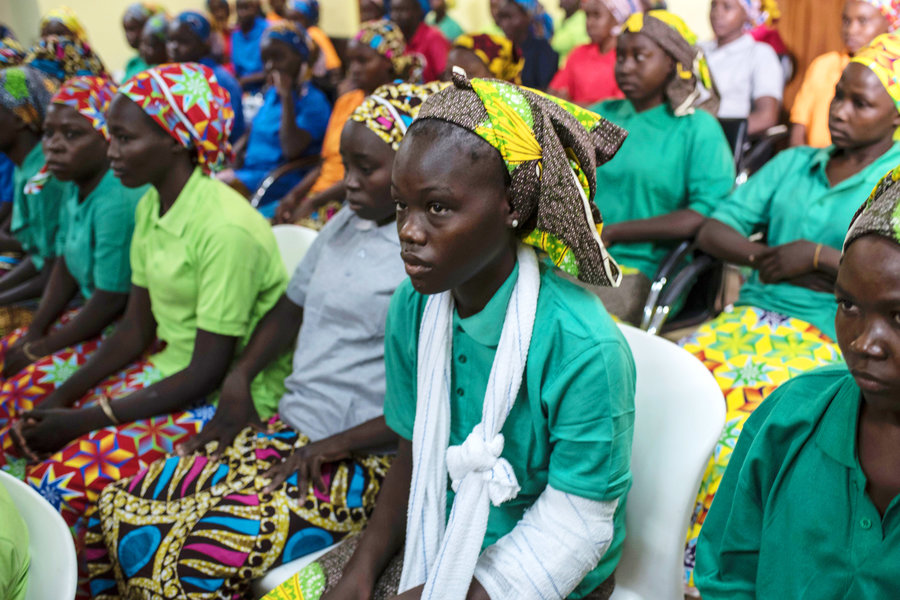
The release of 82 more former pupils of the Chibok Girls Secondary School on May 7, is a welcome development. We must however not be fooled by the federal government’s strategy of making political capital out of this. There are still 113 of the “Chibok girls” held by Boko Haram and thousands more from several abductions in the region. Despite the government’s claim that it has defeated Boko Haram, its activities have resumed over the last couple of months. Finally, the Chibok students have not actually been released – the 82 along with the 21 young women released in October are still being held in a Department for State Security (DSS) facility in Abuja.
It is also worrisome that it took the government almost two years to realise it needed to negotiate with Boko Haram to secure the release of any of the Chibok students. Shortly after the original abduction in 2014, Socialist Worker asked the question “how can the Chibok students be freed?”
We also acknowledged the “commendable courage” of the students, out of whom over 50 became free by taking their fate into their own hands. Socialist Worker provided the answer which took different sections of the bosses’ class (PDP and APC alike) three years to grasp.
“To ensure that all the students return home safely, the government has to negotiate with Boko Haram. Even the United States government, despite all its talk about not negotiating with terrorists, recently released five suspected Taliban members from Guantanamo Bay to secure the release of one American soldier” (Socialist Worker, June/July 2014).
We equally went beyond that in presenting “a bigger picture of terror”, pointing out that “the growth of Boko Haram, was fuelled by the prevalence of abject poverty, rampant unemployment, and utter disillusionment, for poor people, while the politicians and other rich bosses live in luxury, and wallow in corruption.” Eventually, the federal government grudgingly came to the same conclusions.
The 21 young women ‘released’ in October are still detained by the DSS and they have had almost no contact with their parents. Yakubu Nkeki, chair of Chibok Parents’ Association told the BBC, “Every month we pay a visit to them and take their parents too, and they chat to them for almost two or three days before they come back. That is what we did for almost a year now.” The young women have not been given their own phones and their parents only hear from them when the authorities call from blocked numbers.
The most recent group of 82 Chibok young women were handed over by Boko Haram on Saturday 6th May. The next day they were flown to Abuja so that they could be photographed with President Buhari. He left for London the same day. The government clearly thinks that such photo opportunities are more important than the health and welfare of the Chibok young women, their families and friends.
All involved have had to wait over three years for the release of the young women. Negotiations have been going on for at least six months during which time the families waited anxiously for news of their release. The government has now extended their detention and the worry for their families.
The government is talking about them starting school, but there is no sign of Chibok Government Secondary School being rehabilitated. The BBC says it is a “a mess of crumbling concrete, dusty tumbleweed and overgrown brush.”
“They should not be in the captivity of the government after having been in the captivity of the terrorists,” says campaigner Aisha Yesufu. The Government clearly feels that protective custody for the former students of Chibok Secondary School is acceptable. It is also still detaining Zakzaky of the Islamic Movement of Nigeria, and hundreds if not thousands of his supporters along with those supporting the re-establishment of a Biafran state.
At the end of May, the Minister of Women Affairs, claimed that all the ‘released’ Chibok young women were now free to go back to their parents – but as many trade unionists know, government promises are cheap!
Making real progress in the North East requires working-class people to be the driving force of transformative initiatives. Trade unions, community-based associations, civil society organisations, professional bodies etc. must be central in decision-making, including for the rehabilitation of the former Chibok pupils and the formulation and implementation of development projects.
NLC and TUC as well as radical civil society organisations have to rise up to the challenge of providing leadership which holds the government responsible. Organised labour must ensure that poor working-class people who bear the burden of the war in the North East, including the loss or abduction of loved ones, take their fate in their hands, in the struggle for peace, justice and our self-emancipation.
by Yusuf Lawal and Tina Ndi








